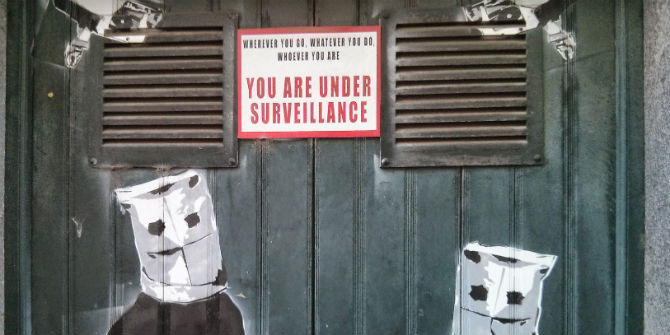 PEN American Center’s report this week, “Chilling Effects” shows that growing surveillance has driven some American writers to censor their work. The findings from the survey of over 500 PEN writers, conducted in October 2013, demonstrate that writers are increasingly worried about surveillance. As a result, some are already engaging in self-censorship and altering their research methods.
PEN American Center’s report this week, “Chilling Effects” shows that growing surveillance has driven some American writers to censor their work. The findings from the survey of over 500 PEN writers, conducted in October 2013, demonstrate that writers are increasingly worried about surveillance. As a result, some are already engaging in self-censorship and altering their research methods.
The troubling implication of these findings is that freedom of expression and freedom of information are being negatively impacted by surveillance programs. The survey found:

- 28% have curtailed or avoided social media activities, and another 12% have seriously considered doing so.
- 24% have deliberately avoided certain topics in phone or email conversations, and another 9% have seriously considered doing so.
- 16% have avoided writing or speaking about a particular topic, and another 11% have seriously considered doing so.
In addition to collecting the above data, the survey also offered writers and PEN American Center members the opportunity to comment and share personal experiences. The written feedback demonstrated that writers now assume that their communications are monitored. Furthermore, the assumption of surveillance is harming freedom of expression by creating a reluctance to cover certain topics, pursue sensitive research, and communicate with international sources.

Other recent analysis, from the Information Society Project at Yale Law School, examined major US newspapers’ “post-Snowden” coverage for pro- or anti-surveillance terms. They found that key words used to justify surveillance, like security or terrorism, were more frequently used than those that promote opposition to mass surveillance, like privacy or liberty.
While the above research is not definitive, and should survey larger, more diverse groups of writers and media outlets, it certainly indicates that further study of the impact of mass surveillance on the media needs to be conducted. Policymakers should be especially concerned by the implications of this research. Any censorship of the media, whether implicit or explicit, state- or self-imposed, is a threat to freedom of information, a well-informed populace, and the proper functioning of a free society. Additionally, this research raises some significant questions about the future of Internet security and free expression online.
What issues does this raise moving forward?
Now that media is more aware that the Internet is a platform for mass surveillance, what happens next? Is there a need for better security protocols for organisations and governments? Does the Internet itself need a redesign? Should we push for regulatory solutions or industry solutions? How can we best protect and encourage freedom of expression among the press and online?
On Friday, November 22, from 12-1:30pm at LSE’s Old building 3.21, the European Network of Excellence on Internet Science and LSE’s Media Policy Project will host a discussion on some of these questions. The lunchtime seminar will focus on the interplay between design, security, regulation and governance in the future Internet. Participants include:
Ian Brown, Associate Director of Oxford University’s Cyber Security Centre, and Senior Research Fellow at the OII.
David Clark, Senior Research Scientist at the MIT Computer Science and Artificial Intelligence Laboratory, who since the mid 70s, Dr. Clark has been leading the development of the Internet.
Chris Marsden, Sussex Professor of Media Law at the University of Sussex, a regular international speaker on Internet law and policy issues
Alison Powell, Assistant Professor, LSE Department of Media and Communication, who studies the role of activism and advocacy on internet design and policy.
Hopefully next Friday’s discussion focusing on these crucial issues will be one of many to come. The research already conducted by PEN and at Yale Law School suggests a need for serious debate about the implications of Internet surveillance on freedom of the press. We must find a way to better balance our security efforts with the vital need for a freely functioning media and free exchange of information.
This article gives the views of the author, and does not represent the position of the LSE Media Policy Project blog, nor of the London School of Economics.





